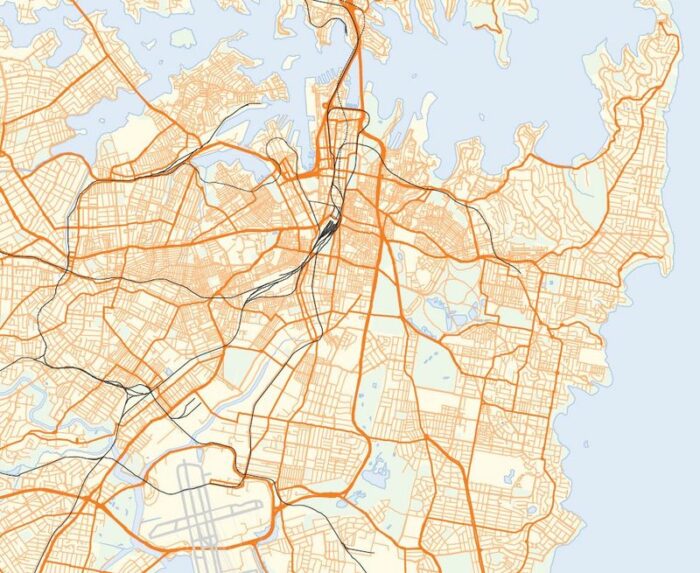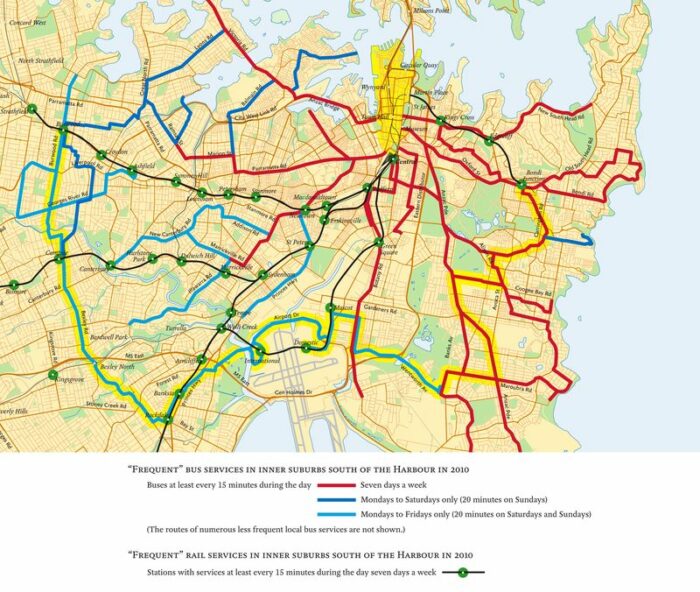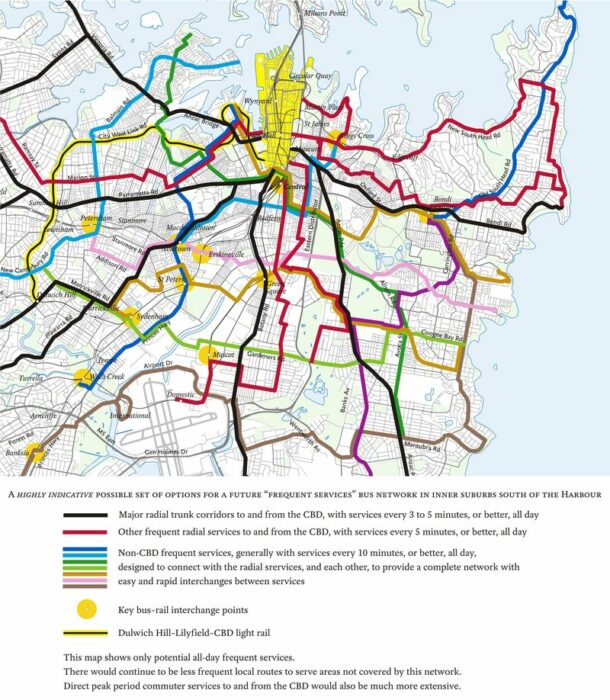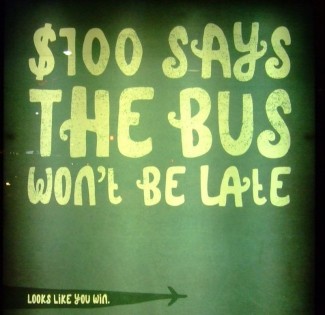Yesterday I posted some data we were playing with, suggesting that Canadian cities have consistently higher transit ridership than similar US ones. Commenter Matt pointed me to his own charts on the subject, which are based on Paul Mees’s database. One of Matt’s charts makes use of citywide average density, a stat to which I’m allergic for reasons explained here and here. But here’s the other one. Continue Reading →
Sydney
Request for Information: Canadian Ridership (Updated)
Some colleagues and I have lately had occasion to compare public transit performance in young metro areas of 1-3 million, across North America and Australasia, and we’ve been turning up draft charts like this one (click to enlarge): Continue Reading →
Sydney: The Transport Inquiry’s Final Report
The Sydney Morning Herald’s Indepent Public Inquiry on Transport published its final report yesterday. I had a major role in the preliminary report, which I discussed here, but not in the final.
The Herald’s coverage today focused on the big controversy about what the next rail project should be, and also on the dangers of spread-out job growth. But in my view, the Inquiry’s most important work was the discovery, through public surveying and financial analysis, that a comprehensive network of improvements — extending the old commuter rail network and also upgrading it to offer the frequencies of an urban metro — could be funded with a package of sources that a majority were willing to support. All of these sources are politically radioactive if you just propose them in a vacuum: Congestion charges! Higher fuel taxes! Higher property taxes! Higher fares! But if you package them carefully with the transformative improvements that they buy, you could win a referendum. Continue Reading →
Australia: Pitfalls of Metro Envy
The Public Transport Users Association of Australia has a great press release and analysis on the need to re-think the ideal of a “metro,” and to question why Australians should wait decades for them. Continue Reading →
Willingness to Pay for Transit Improvements
Do your city’s political leaders understand what funding sources people would support if they knew what they were buying? A few weeks ago, the Source (a blog by the Los Angeles transit agency Metro) reported on a survey showing that current riders would pay 50c more in fares for a doubling of their frequency of service. This isn’t as encouraging as it sounds, because a doubling of frequency, even with significant ridership increases as a result, will cost a lot more than 50 cents per new rider. But it’s a useful soundbite. These questions, broadly called “willingness to pay” questions, need to be asked more, and more probingly. Continue Reading →
Sydney: Grid Networks for Gridless Cities
Whenever I talk about the value of grid networks, as I did here, someone always says: But my city isn’t a grid. For example, Sydney, where I live now, is about as ungridlike a city as you’ll encounter. In fact, there’s no large system of order in Sydney’s road network at all. Some roads follow what were once Aboriginal tracks, but mostly it just grew, one bit at a time, an accretion of millions of short-term decisions.
One of Sydney’s biggest problems is that the road network is so focused on the CBD (the Central Business District located top-centre in this image) that traffic is forced into the CBD that doesn’t want to be there. But the problem is much, much worse if you’re a transit passenger. As part of the Sydney Morning Herald‘s Independent Public Inquiry, discussed here, I did a quick review of the inner-city bus network looking for the pattern of frequent service — service that runs every 15 minutes or better all day. The frequent network is the portion of the network where you don’t have to worry about a timetable, and where transit can therefore be used with some sense of spontaneity and freedom. To my knowledge, nobody had drawn a map of inner Sydney’s frequent network before. It turned out to look like this:
If you want to get around with any spontaneity in the inner part of Sydney — where densities are highest, obstacles to driving are greatest, and car-free lifestyles should be most attractive — the network forces you to go through the CBD (the yellow wedge on the north edge of the drawing). In the whole inner city of Sydney there is only one frequent crosstown or orbital service — one that runs perpendicular to the radial lines, like the circular element of a spider web. It’s highlighted in yellow. By contrast, most major North American and European cities have a whole grid of these orbital services; they are often the most productive routes in the network, in terms of ridership per unit of operating cost.
As part of the inquiry, I sketched a map to give just a taste of what an inner city frequent grid network might look like for Sydney. It’s not a proposal, just a possible starting point for thinking about one. But if you can’t imagine doing a grid network in a gridless city, you might find it interesting to stare at for a bit. (All this is in the Preliminary Report of the Inquiry, in Section 4.2, and readers interested in the local detail are encouraged to dig there.)
Sydney’s road network is so radial, and the CBD is such a large destination, that the grid takes more of a spider-web form (as defined here). I highlighted this in the diagram by using black and red for radial lines and all the other colours for orbitals, so that people could see how orbital services might work and how they could all fit together, with each other and with commuter rail and light rail, to form a complete inner city network.
But in the middle part of the map you’ll notice some lines that do try to run straight east-west, even though the lacerated street network requires you to make many turns to keep going the same direction. As I explored in more detail here, most grid networks involve a fusion of standard rectangular grid lines and spider-web (or polar grid) lines. The rectangular lines express a “serve everywhere” impulse, while the spider-web lines express a “focus on the centre” impulse. Network design is a process of finding the balance and making them work together.
There are many ways to design such a pattern for Sydney. A detailed planning effort would feature months of work exploring various options, but what I sketched here, based on three years’ observation of the inner city and about three hours of focused thought, is at least a step toward visualizing the future.
So yes, your city may not be a grid. But still, if you want a transit network that’s useful for going at high frequencies from anywhere to anywhere, the answer will be some kind of grid, built on connections, with some mix of rectangular and spider-web elements, all fitted with more or less struggle to the unique shape of your city.
The Power and Pleasure of Grids
Why do transit planners love grids? Now and then you’ll even hear one muttering about “grid integrity” or “completing the grid.” What are they talking about?
Suppose you’re designing an ideal transit system for a fairly dense city where there are many activity centers, not just one big downtown. In fact, you don’t want to give preferential treatment to any point in the city. Instead, you want people to be able to travel from literally anywhere to anywhere else by a reasonably direct path, at a high frequency. Everybody would really like a frequent service from their home to everywhere they ever go, which is pretty much what a private car is. But money isn’t infinite, so the system has to deliver its outcome efficiently, with the minimum possible cost per rider. What would such a system look like? Continue Reading →
Sydney: Driverless Metro Postponed?
I’m keenly aware of the irony of having praised Vancouver’s driverless metro on the very day that Sydney’s driverless metro proposal was declared dead by the city’s main newspaper. I’m also aware that as part of the team that authored the Independent Inquiry (now widely called the Christie Report) which recommends postponing Sydney’s metro project, I could be misunderstood as saying that what’s good enough for Vancouver isn’t good enough for Sydney. Continue Reading →
Sydney: An “Independent Inquiry” on Public Transport
For the last four months, I’ve been part of a team looking at the big-picture problems of public transport in Sydney, sponsored but not controlled by the city’s main newspaper, the Sydney Morning Herald. We released the draft report today, so I can finally talk about it. Continue Reading →
Transit Advertising and Transit Self-Esteem
This Air New Zealand ad, on a bus shelter in Sydney, raises the issue of transit self-esteem. “$100 says the bus won’t be late,” it says, then, in much smaller print: “Looks like you win.”
Should transit agencies accept advertising that demeans their service?
Advertisers are often tempted to do exactly that, especially when selling vacations or other forms of escape from the everyday. The bus is both a profitable site of advertising and an irresistible metaphor for the tedious life. If you imagine your transport mode as a romantic partner, the bus in mixed traffic is the worst of both worlds: neither sexy nor capable of commitment. When advertising on a bus, it’s not surprising that advertisers find ways to play on that. Continue Reading →



